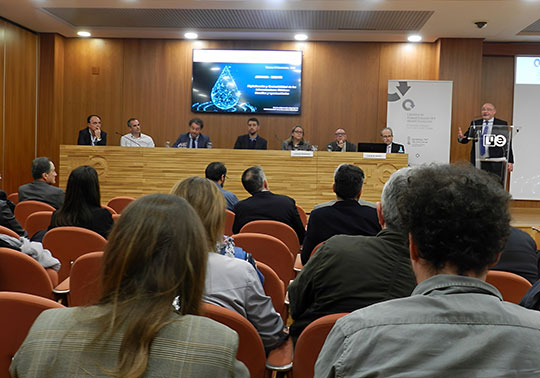
The public and corporate perspective of digitalisation and sustainability of water infrastructures, problems for its implementation in the smallest municipalities or the regulatory and economic barriers that difficult it, have been some of the commented aspects in the seminar.
Director of the Transformation of the Economic Model Chair: Circular Economy in the water Sector of the Generalitat Valenciana and the Universitat de València (GVA-UV), Francesc Hernández, said that we need to progress “determinedly to a more efficient and sustainable management of the urban water cycle with a full modernisation and digitalisation contributing to reduce energy consumption, correcting water losses and enhancing the useful life of water facilities”.
Hernández made these declarations during the seminar ‘Digitalización y Sostenibilidad de las Infraestructuras Hídricas: Desafíos y Oportunidades’ (‘Digitalisation and Sustainability of Water Infrastructures: Challenges and Opportunities’) that took place in the principal office of ADEIT- University-Business Foundation of the Universitat de València were participated several specialists on the field who are responsible of public and private entities. The autonomic secretary of Economic Model and Funding of the GVA, María José Mira, who also attended the seminar, opened the event, whereas the vice-principal of Innovation and Transfer of the Universtat de València, Rosa Donat, closed it.
“Digitalisation offers a big opportunity in order to improve the integral urban water cycle in all its stages, from catchment to purification, distribution, sanitation and treatment to reuse”, explained Hernández to the attendants. “In addition, in a context of circular water economy, digitalisation plays an important role in purification plants of wastewater where the main opportunities include technologies with mathematical models, as well as support systems in decision-making”.
The coordinator of Recovery Funds, Transformation and Resilience of the Ministry for the Ecologic Transition, Adolfo Torres, explained that the directorate-general of Water is planning to increase the funds of the Recovery Plan, Transformation and Resilience aimed to the water digitalisation “not only to the urban water cycle, but also to agricultural and industrial purposes with the aim to adapt themselves to the current scenery of climate change apart from reducing water waste.
The manager of the Wastewater Public Entity of the Valencian Community (EPSAR) Juan Ángel Conca, went over the Spanish regulations on digitalisation in water facilities and highlighted the need of PERTE grants being equal in all towns, specially the smallest, as well as the importance of collection and transfer data that this digitalisation allows.
On the other hand, the director of Global Ommium Operations, Javier Macian, the general director of Facsa, José Claramonte, and the Regional Director of Hidraqua, Francisco Bartual, talked about the business perspective of digitalisation and sustainability of water facilities of the water urban cycle. Moreover, they highlighted the advantages that this digitalisation involves when it comes not only to the processes improvement, but also to the optimization in decision making, among others; as well as the need of receiving state aids because of the impact that the energy prices has in the costs they stand.
The event also included several conferences about the municipal insight on digitalisation and sustainability in which participated the councillor of the Integral Water Cycle of the Valencia City Hall, Elisa Valía, the responsible PERTE of the Council of València , Francesc Barcelón, and the general coordinator of the Valencian Federation of Municipalities, Eugeni de Manuel, who highlighted the need of putting the subject of water at the centre of the debate and introducing digitalisation, especially in sanitation and purification, as well as in small towns where its implementation entails a greater difficulty.
In the seminar it was also organised roundtable discussions in which, apart from the different aforementioned entities, also participated the Metropolitan Agency for Hydraulic Services (EMSHI) in which subjects such as the need of Ministry grants for the Ecologic Transition to the smallest towns in order to introduce digitalisation, the terms of the current public-private collaboration when it comes to water or the regulatory barriers and economic resources that complicate this digitalisation were treated. On the other hand, the president of the Spanish Association of Water Supply and Wastewater (AEAS), Fernando Morcillo, as attendant of the event, put special attention on the essential economic sustainability of the urban water cycle and on the review of its costs structure.









